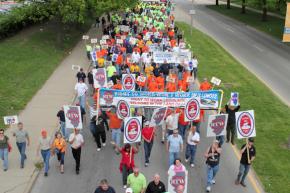Right-to-work won’t work
reports on the massive protest that greeted an anti-labor Republican.
MARCHING UNDER the slogan "Right-to-work won't work in Illinois," 5,000 labor union members and their supporters from across the state turned out in Champaign, Ill., April 19 to tell union-busting Indiana Gov. Mitch Daniels that his anti-worker laws aren't welcome here.
Two months after signing "right-to-work" legislation in his own state, Daniels was in Champaign to give the keynote speech at the Champaign County Republican Party's annual Lincoln Day Dinner.
Unfortunately for him and his anti-union Republican counterparts, a huge crowd gathered to give him the un-welcome he deserved. Unionized workers from around Illinois, joined by students and local activists, showed up in droves to protest Daniels' anti-union policies and voice their opposition to any potential right-to-work legislation in Illinois.
Right-to-work laws, which currently exist in 23 states, attack workers' rights by severely limiting the ability of unions to organize in individual workplaces. By making it more difficult for unions to ensure that all employees at a workplace are union members, the laws hamstring the ability of workers to collectively bargain, making it difficult, if not impossible, for them to obtain living wages, fair benefits and safe work environments.

Union locals were present from many unions, including the International Brotherhood of Electrical Workers (IBEW), International Association of Iron Workers, United Brotherhood of Carpenters and Joiners, United Steelworkers, and United Association of Plumbers, Fitters and Welders, as well as representatives from the AFL-CIO and Chicago Federation of Labor.
"[I'm here] to let Mitch Daniels know that we are here to fight," said Don Hudson of IBEW Local 193 in Springfield, Ill. "It would be to the detriment of all working people if the legislation passes. If passed, we would lose benefits, [safe working] conditions, wages [and the right to] negotiate fair contracts. When we lose, all working people lose. We are here to fight. Never retreat, never surrender!"
Ricky B. of Service Employees International Union Local 73, which represents more than 25,000 public service employees in Illinois and northwest Indiana, stressed the necessity of working-class unity in face of the unity among those attacking the working class. "Right-to-work has been extremely destructive in Indiana, and we have enough problems in Illinois without adding to them," he said. "Right-wing legislation is done by the same people [in both states]."
Members of Occupy CU (Champaign-Urbana) and Occupy Chicago were present as well. "[I came here] to stand up for the rights of workers," said Timm. "At Occupy Chicago, we've been fighting for the middle class, working people, to bring power back to the 99 percent. Union support at Occupy Chicago rallies has been important to show solidarity. There's a war on the middle class, and it's part of the overall mentality of the right."
THE RALLY took place amid an ongoing unionization fight by workers at an Urbana, Ill., plant owned by auto parts manufacturer Flex-N-Gate. The plant's workforce is composed largely of immigrants who receive low pay and no benefits while being exposed to carcinogenic materials.
Shahid Khan, owner of Flex-N-Gate, is one of the 200 wealthiest people in the U.S., yet he refuses to provide workers with federally mandated safety equipment. It is an apt illustration of the conditions that millions of other Illinois workers could face if RTW legislation is passed.
The rally was also part of a wider statewide fight against anti-union governors from neighboring states. Two days prior to the Champaign rally, a crowd of 3,500 gathered in Springfield to protest a speech by union-busting Wisconsin Gov. Scott Walker, and hundreds more turned out to protest another Walker speech on April 20 in Lincolnshire, outside Chicago.
The right's and the media's duplicity in referring to legislation that reduces workers' ability to collectively bargain as "right to work" was not lost on anyone at the rally. Of course, the phrase can also be seen as incomplete rather than inaccurate, as "right to work cheap" is an excellent description of the situation workers subject to this legislation find themselves in.
If the anti-union zealots who espouse right-to-work-cheap legislation were to consult Article 23 of the UN's Universal Declaration of Human Rights, they would find that Section (1) uses the exact phrase "right to work," while adding that this includes the right "to just and favorable conditions of work and to protection against unemployment," while Section (4) states that "Everyone has the right to form and to join trade unions for the protection of his interests." In other words, the exact same rights that workers in Illinois and across the nation hope to preserve by opposing "right-to-work-cheap" legislation.
And oppose it they must--by self-mobilizing and fighting back independently--because if workers' enemies can so easily turn such language on its head, there is no hope that legislation at any level will be enough to protect them. Only by self-mobilizing and taking part in actions like this one can we hope to confront the 1 percent's global attack on our rights to organize our own workplaces and communities.


